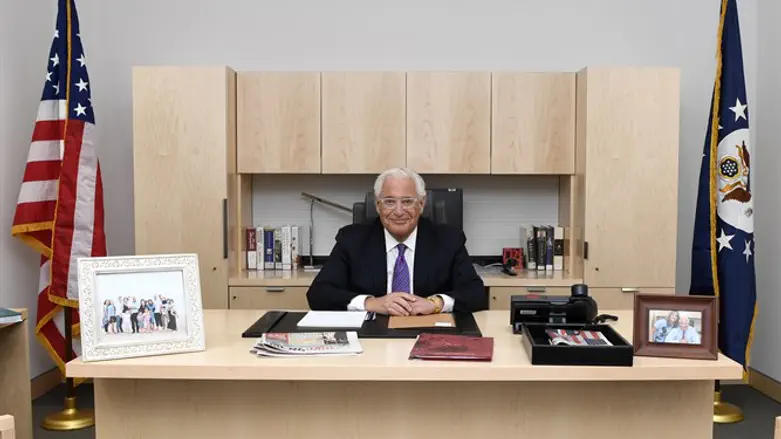
US Ambassador to Israel David Friedman celebrated the holidays of the Hebrew month of Tishrei in Israel with a broad smile.
Ambassador Friedman was surrounded by his family, many grandchildren who were looking for his closeness, until the start of our interview, and afterward. He received an embrace wherever he went, including in the Western Wall plaza where he arrived on Sukkot for the traditional priestly blessing.
A significant change has occurred in US-Israeli relation in the year-and-a-half since Ambassador Friedman assumed his position. In the past year alone, the Trump Administration has relocated the US embassy to Jerusalem, withdrawn from the 2015 Iran nuclear agreement, cut funding to the Palestinian Authority over its payments to terrorists, and cut funding to UNRWA, in addition to standing by Israel in international forums.
Ambassador Friedman said that American support for Zionism dates back hundreds of years. "There is a long historical connection between the United States and Israel that goes back to May 14, 1948. And even beforehand, when Israel was being conceived, even. It goes back to the pilgrims, when they came to the United States and thought they were creating the new Jerusalem and prayed that they would have the support of the G-d of Israel. The entire 19th century is full of Christian Zionists who sought to advance the return of the Jews to the land of Israel."
He added: "The United States opened the first consulate here in 1844, 104 years before the State of Israel was even created. So the return of the Jewish people to Zion is really ingrained in popular and historical relations between the parties. So you have that component. You have a second component, which is that our interests are so aligned. It seems that almost every nation that hates the United States also hates Israel. Countries that don't value America don't value Israel, because we're really two countries out of a very small number that have this real commitment to freedom and democracy, even under real challenges. I don't think that there is another bilateral relationship in the world which is the same as Israel and the United States."
The ambassador addressed concerns that the US would force Israel to pay a price for having moved the embassy to Jerusalem. "In the overall negotiations, it's hard to ignore the reality that the United States took this very important step in favor of Israel. But what I've said before and will continue to say, is that there is no specific concession that we have asked or will ask from Israel because the embassy moved. It's just that, having done it, having moved the embassy, we're expecting Israel will trust us, recognize that we have their best interests at heart, and engage in negotiations in good faith. It's not more complicated than that."

He said that the Trump Administration has not acted to prevented construction of homes for Jews in Judea and Samaria as the Obama Administration did. "We're interested in where Israel is going with the settlements, and so we have discussions. Our view is that, to the greatest extent possible, settlement growth should be from the inside-out, meaning they should grow within internal communities."
"The president has indicated that, to the greatest extent possible, maintain the option in Area C for land to be made available, but don't stop settlement construction either. Where that gets harmonized is [in our] discussions. We talk it through. They don't need our permission, but I think the government of Israel would like to be on the same page as the United States, and so we have these discussions. And so far it's worked out very well."
Addressing fears that the next US administration would reverse President Trump's pro-Israel policies and move the embassy back to Tel Aviv, Ambassador Friedman said: "Politics always change. It seems to me very unlikely that the embassy would return to Tel Aviv because the statement that would have to be made in order to move it would be to say that Jerusalem is not the capital of Israel. And nobody thinks that. I'm not aware of anybody in the United States who feels that way. Even before the embassy was moved to Jerusalem, the entire Congress recognized that Jerusalem is the capital of Israel. So moving the embassy was consistent with Congressional will, the people's will, and the truth. Moving it back, I can't see a world where that would be justified, so I don't think that will be politicized."